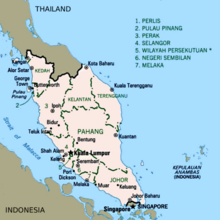Peninsular Malaysia
Coordinates: 4°0′N 102°30′E / 4.000°N 102.500°E

Peninsular Malaysia (Malay: Semenanjung Malaysia), also known as West Malaysia or the Malaysian Peninsula, formerly known as Malaya, is the part of Malaysia which occupies the southern half of the Malay Peninsula in Southeast Asia and the nearby islands.[1] Its area totals 132,265 km2 (51,068 sq mi), which is nearly 40% of the total area of the country; the other 60% is East Malaysia. For comparison, it is slightly larger than England (130,395 Km2). It shares a land border with Thailand to the north.[2]
Across the Strait of Malacca to the west lies the island of Sumatra (Indonesia) and across the South China Sea to the east lie the Natuna Islands of Indonesia. At the southern tip across the Strait of Johor lies the island country of Singapore. Peninsular Malaysia accounts for the majority (roughly 81.3%) of Malaysia's population and economy; as of 2017, its population is roughly 26 million (82% of total population).[citation needed]
States and territories[]

Peninsular Malaysia consists of 11 out of the 13 states, and two out of the three federal territories of Malaysia. The capital city, Kuala Lumpur is also in Peninsular Malaysia.
- Northern Region: Perlis, Kedah, Penang, Perak
- East Coast Region: Kelantan, Terengganu, Pahang,
- Central Region: Selangor, federal territories of Kuala Lumpur and Putrajaya
- Southern Region: Negeri Sembilan, Malacca, Johor
Etymology[]

Peninsular Malaysia is also known as West Malaysia (Malaysia Barat) or the States of Malaya (Negeri-negeri Tanah Melayu).[3][4]
Demographics[]
Ethnicity in Peninsular Malaysia (2020)
The majority of people on Peninsular Malaysia are ethnic Malays, predominantly Muslim.[5] Large Chinese and Indian populations exist. The Orang Asli are the indigenous people of Peninsular Malaysia; they number around 140,000 and mostly live in inland parts of the region.[citation needed]
Economy[]
As of 2012, Peninsular Malaysia oil production stood at 520,000 barrel of oil equivalent per day.[6]
Other features[]
East Coast and West Coast[]
The term East Coast is particularly used in Malaysia to describe the following states in Peninsular Malaysia facing the South China Sea, a component of the Pacific Ocean:
The term West Coast refers informally to a collection of states in Peninsular Malaysia situated towards the western coast generally facing the Strait of Malacca which is a component of the Indian Ocean, as opposed to the East Coast. Unlike the East Coast, the West Coast is partitioned further into three regions (as seen in #States and territories), including:
- The Northern Region: Perlis, Kedah, Penang and Perak.
- The Central Region: Selangor and the federal territories of Kuala Lumpur and Putrajaya.
- The Southern Region: Negeri Sembilan, Melaka and Johor.
Even though Johor has a coastline facing the South China Sea on the Pacific Ocean, it is not generally regarded as an East Coast state, since the main coastline of the state is located on the Straits of Johor of the Indian Ocean.
West and East Malaysia[]
The distinction between West and East Malaysia (Sabah and Sarawak) goes beyond the sphere of geography. Being separate regions administratively before the formation of the Malaysia, there exists more autonomy than the original States of Malaya, e.g. in having a different judicial court structure and separate immigration regulations. These rights were granted as part of Sarawak's 18-point agreement and Sabah's 20-point agreement with the Federation of Malaya during the formation of expanded federation.
See also[]
- Malaya (disambiguation)
- Malayan dollar
References[]
- ^ Earth from Space: Separation by sea
- ^ "Malaya". Cite journal requires
|journal=(help) - ^ Mohamed Anwar Omar Din (2012). "Legitimacy of the Malays as the Sons of the Soil". Asian Social Science. Canadian Center of Science and Education: 80–81. ISSN 1911-2025.
- ^ Reid, Anthony (2010). Imperial alchemy : nationalism and political identity in Southeast Asia. Cambridge University Press. p. 95. ISBN 978-0-521-87237-9.
- ^ "Some aspects of Malay-Muslim Ethnicity in Malaya". June 1981. JSTOR 25797648. Cite journal requires
|journal=(help) - ^ "Petronas sees growth slowdown until 2014". The Star (Malaysia). 6 March 2012. Archived from the original on 1 September 2019. Retrieved 1 September 2019.
External links[]
![]() Media related to Peninsular Malaysia at Wikimedia Commons
Media related to Peninsular Malaysia at Wikimedia Commons
 Peninsular Malaysia travel guide from Wikivoyage
Peninsular Malaysia travel guide from Wikivoyage
- Peninsular Malaysia
- Malaya
- Malay Peninsula
- Geography of Malaysia
- Regions of Malaysia
- Metropolitan or continental parts of states
- Peninsulas of Southeast Asia

